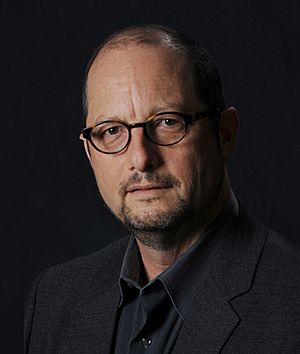Bart D. Ehrman facts for kids
Quick facts for kids
Bart D. Ehrman
|
|
|---|---|

Ehrman in 2012
|
|
| Born |
Bart Denton Ehrman
October 5, 1955 Lawrence, Kansas, U.S.
|
| Education | |
|
Notable work
|
|
| Spouse(s) | Sarah Beckwith |
| Scientific career | |
| Institutions | |
| Thesis | The Gospel Text of Didymus (1985) |
| Doctoral advisor | Bruce M. Metzger |
Bart Denton Ehrman (born October 5, 1955) is an American expert on the New Testament. He studies the Bible's ancient texts and the early history of Christianity. He has written and edited 30 books, including several that became New York Times bestsellers. He is a respected professor at the University of North Carolina at Chapel Hill.
Contents
About Bart Ehrman
His Early Life and Education
Bart Ehrman was born in Lawrence, Kansas, on October 5, 1955. He grew up there and was part of his high school's debate team. He started studying the Bible and its ancient languages at Moody Bible Institute.
He earned his first degree from Wheaton College in 1978. Later, he earned two more degrees from Princeton Theological Seminary. He finished his PhD in 1985, focusing on how Bible texts changed over time.
His Journey of Belief
Ehrman grew up in the Episcopal Church. As a teenager, he became a "born-again" evangelical Christian. He believed that God had inspired every word of the Bible and protected it from mistakes.
This belief made him want to study the Bible's original words. He learned ancient languages like Koine Greek. But during his studies, he found many differences in the old Bible copies. He realized that scribes (people who copied texts) had changed them over time.
He wondered why God would inspire the text but not keep it from being changed. This led him to question his earlier beliefs. He later became a liberal Christian. After thinking about the problem of evil and suffering in the world, he became an agnostic atheist. This means he doesn't claim to know if God exists.
Bart Ehrman's Books and Ideas
Ehrman has written many books about the New Testament and early Christianity. His books are for both scholars and general readers. Six of his books have been New York Times bestsellers. Over two million copies of his books have been sold worldwide.
Understanding Jesus and Early Christianity
In his book Jesus: Apocalyptic Prophet of the New Millennium, Ehrman suggests that Jesus was a Jewish preacher who believed the world's end was near. He thought God would soon create a new kingdom on Earth. Jesus and his followers believed these events would happen in their lifetimes.
In Misquoting Jesus, Ehrman explains how New Testament manuscripts developed. He also describes how errors happened when these ancient texts were copied.
His book Jesus, Interrupted talks about what scholars have learned about the Bible over the last 200 years. He points out that the New Testament contains different viewpoints. He also discusses how some books in the New Testament might have been written by people pretending to be apostles.
Exploring Forgery in Ancient Texts
In Forged, Ehrman argues that some New Testament books are literary forgeries. This means they were written by someone other than the person they claim as the author. He shows that forgery was common among early Christian writers. However, it was also seen as wrong in the ancient world.
His scholarly book, Forgery and Counterforgery, goes deeper into this topic. It explains why some early Christian writings are considered forgeries.
The Historical Jesus
In Did Jesus Exist? The Historical Argument for Jesus of Nazareth (2012), Ehrman defends the idea that Jesus of Nazareth was a real historical person. He argues against the theory that Jesus was entirely made up.
His 2014 book, How Jesus Became God, explores how Jesus came to be seen as God. Ehrman believes that Jesus himself did not think he was God or claim to be God.
The Triumph of Christianity
In The Triumph of Christianity: How a Forbidden Religion Swept the World, Ehrman notes that early Christianity had many different forms. But eventually, one form, Nicene Christianity, became the main one. This happened under the rule of the Roman Emperor Constantine.
Heaven and Hell: A Historical Look
His book Heaven and Hell: A History of the Afterlife looks at how ideas about the afterlife developed. He traces these ideas through Greek, Jewish, and early Christian cultures. He shows how they eventually led to the concepts of Heaven and Hell that many Christians believe in today.
Courses and Lectures
Ehrman has also created several courses for "The Great Courses." These courses include many 30-minute lectures on topics related to the New Testament and early Christianity.
Personal Life
Bart Ehrman is married to Sarah Beckwith. She is a professor of medieval literature at Duke University. He has two children from his first marriage.
See also
 In Spanish: Bart Ehrman para niños
In Spanish: Bart Ehrman para niños
 | Selma Burke |
 | Pauline Powell Burns |
 | Frederick J. Brown |
 | Robert Blackburn |

